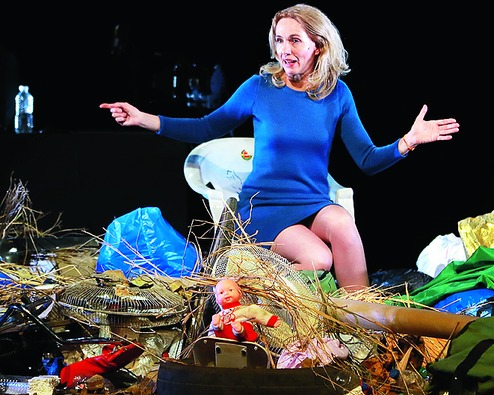
This review should not have come out in the present unfortunate circumstances. But appearing as it does after Pijush Ganguly's premature death, from an accident that in any developed country could have been averted, I feel compelled to pay homage to an excellent actor who had so much more to offer Bengali theatre in the years ahead.
He started his stage career in the mid-1980s, soon after I began reviewing for The Telegraph, so I had the pleasure of seeing him in many productions. Based on that knowledge, I can confidently state that his role as Mr Peachum (picture, with wife and daughter), king of the beggars in Brecht's Threepenny Opera translated as Tin Penny Opera by Anjan Dutt, constituted his most mature performance that I have witnessed - not only in terms of giving it complexity through acting, but also the total surprise of his fluent singing in jazz idiom, highly unusual for Bengali theatre. I really thought it marked a turning point for him, after which we could expect him to do even greater things. Director Chanda Dutt will find it very hard to replace him.
In spite of her declaration that she did not follow Brechtian alienation effects, the Anjan Dutt Production expressed the aims of epic theatre truthfully, no doubt facilitated by the Dutts' extensive experience of staging Brecht. Thus, the script's faithful location in the "there and then" of old London instead of the here and now of, say, today's Calcutta, did not tax us much to recognize the universal nexus between criminals and coppers, or the fact that Peachum's firm of con-artist beggars runs on strictly capitalistic business principles like our corporates. Not just that, the topicality of our city turning into a copy of London got a topsy-turvy twist, raising an ironic smirk.
Anjan newly translated the play from the two famous joint translations in English, by Ralph Mannheim and John Willett (misspelt in his translator's note), and Desmond Vesey and Eric Bentley (not Bentley alone, as cited by Dutt). He rendered both the dialogues and songs freely rather than with fidelity, yet captured the Brechtian spirit and scurrilousness. Viewers might even believe that he interpolated Macheath's concluding criticism of banks as a contemporary touch, until they discover that Brecht wrote these prophetic thoughts himself.
The smartest theatrical interpretation is the twinning of Macheath (Anjan) and police chief Tiger Brown (Debdut Ghosh), their nearly identical black leather outfits conveying an ego/alter ego relationship, justified in Brecht by their youthful misadventures as British Indian Army buddies and embellished here by their physical bonding touching on homoeroticism, which for Macheath seems much deeper than his serial flings with women. This gels completely with Brecht's conception that in civilian life, one went on to become a thief and the other a policeman, but both essentially remained the same.
Chanda's instruction to Anjan to act "passionately" of course blasphemes against Brecht's anti-Aristotelian doctrines, but deliberately or not, his Macheath exudes a detached world-weariness - that perfect German word, weltschmerz - which distances him from immediate happenings, making him in fact more Brechtian, until his abject sentimental pleadings in prison show him as human and remind us of his Galileo.
Another intervention came in the cold-hearted characterization of Ginny Jenny (Mishka Halim), whose second betrayal of Macheath looked calculated rather than like plain carelessness, underlining Brecht's ideology that monetary considerations always corrupt - in this case even the one woman whom Macheath had trusted fully. Meanwhile as Polly, Daminee Basu gave one of her best accounts to date, changing with fine comic flair from Macheath's virginal but startled bride to shrewd and manipulating boss of his gang. Sudipa Basu played her mother, merrily inebriated to the hilt. The acting did not suffer down the line, as illustrated by Souptic Chakraborty and Debopriyo Mukherjee, Macheath's Tweedledee-Tweedledum henchmen.
Last but certainly not the least: the arrangement of the tough original score composed by Kurt Weill (not Weil), one of the earliest instances of "serious" music embracing "low" jazz. Amyt Datta and Neel Dutt stuck to the small-quartet jazz flavour, bravely resisting the easy temptation to give Anjan's lyrics a Bangla-band feel. Instead Amyt, consciously suppressing his natural classic-rock style, evoked the single-string runs of the legendary Django Reinhardt in 1930s mode, close enough to Brecht's time, with Neel (guitar), Tatai Dey (bass) and Deboprotim Baksi (drums) providing solid support. All the principals sang exceptionally well, maintaining the requisite raw edginess of the sound. Chanda's directorial comeback deserves encores, perhaps moving on to great dramatists other than Brecht?










